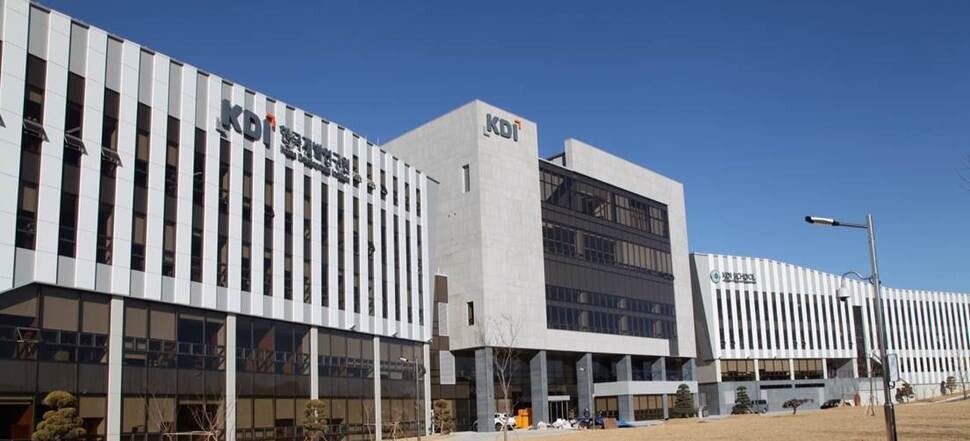hankyoreh
Links to other country sites 다른 나라 사이트 링크
Park Geun-hye’s structural reforms “unilateral, uncommunicative and massively corrupt”

Unilateral, uncommunicative and massively corrupt - these were some of the stinging assessments of structural reforms by the administration of former president Park Geun-hye made by experts from various fields who participated in a debate organized by the government-funded Korea Development Institute (KDI) on Apr. 4 called “Structural Reform over the Past Four Years: Results and Reflection.” In Jan. 2014, Park announced her three-year plan for economic innovation, along with what she called the “474 Vision” of using four major structural reforms in the public sector, labor, finance and education to achieve an economic growth rate of 4%, an employment rate of 70% and per capita income of US$40,000.
“Park did not succeed at reforming areas that require public participation and social consensus, such as labor reform,” concluded Kim Ji-hun, director of the KDI’s economic information center, on Apr. 4. “With South Korea rapidly losing its engine for growth, there was an obvious need for structural reforms to replace the existing growth model. But a three-year plan was not nearly long enough to harmonize the interests and positions of the various stakeholders.”
The government launched the Korea Tripartite Commission of Labor, Management and Government during Park‘s first year in office, through which it promoted dialogue for labor reform, and in Sep. 2015, it reached a consensus on shorter working hours and on making the labor market more flexible. But the government subsequently provoked resistance from organized labor with a unilateral attempt to revise labor legislation.
Criticism was also voiced about reform of the public sector. “There were some tangible results in increasing the efficiency of poorly managed government agencies, but this is only reform of the public sector in an extremely narrow sense. We still have a long way to go in regard to transparency and public trust in the government and public institutions,” said Kang Jeong-seok, director of the strategy and coordination office of the Korea Institute of Public Administration.
By Heo Seung, staff reporter
Please direct questions or comments to [english@hani.co.kr]

Editorial・opinion
![[Column] Season 2 of special prosecutor probe may be coming to Korea soon [Column] Season 2 of special prosecutor probe may be coming to Korea soon](https://flexible.img.hani.co.kr/flexible/normal/500/300/imgdb/original/2024/0426/3317141030699447.jpg) [Column] Season 2 of special prosecutor probe may be coming to Korea soon
[Column] Season 2 of special prosecutor probe may be coming to Korea soon![[Column] Park Geun-hye déjà vu in Yoon Suk-yeol [Column] Park Geun-hye déjà vu in Yoon Suk-yeol](https://flexible.img.hani.co.kr/flexible/normal/500/300/imgdb/original/2024/0424/651713945113788.jpg) [Column] Park Geun-hye déjà vu in Yoon Suk-yeol
[Column] Park Geun-hye déjà vu in Yoon Suk-yeol- [Editorial] New weight of N. Korea’s nuclear threats makes dialogue all the more urgent
- [Guest essay] The real reason Korea’s new right wants to dub Rhee a founding father
- [Column] ‘Choson’: Is it time we start referring to N. Korea in its own terms?
- [Editorial] Japan’s rewriting of history with Korea has gone too far
- [Column] The president’s questionable capacity for dialogue
- [Column] Are chaebol firms just pizza pies for families to divvy up as they please?
- [Column] Has Korea, too, crossed the Rubicon on China?
- [Correspondent’s column] In Japan’s alliance with US, echoes of its past alliances with UK
Most viewed articles
- 1Samsung subcontractor worker commits suicide from work stress
- 2‘We must say no’: Seoul defense chief on Korean, USFK involvement in hypothetical Taiwan crisis
- 3[Editorial] Korea’s surprise Q1 growth requires objective assessment, not blind fanfare
- 4Division commander ordered troops to enter raging flood waters before Marine died, survivor says
- 5Is Japan about to snatch control of Line messenger from Korea’s Naver?
- 6No good, very bad game for Korea puts it out of Olympics for first time since 1988
- 7US overtakes China as Korea’s top export market, prompting trade sanction jitters
- 8N. Korean delegation’s trip to Iran shows how Pyongyang is leveraging ties with Moscow
- 9Korea’s 1.3% growth in Q1 signals ‘textbook’ return to growth, says government
- 10[Column] Season 2 of special prosecutor probe may be coming to Korea soon